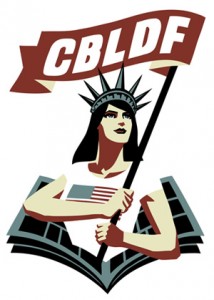 This week, a coalition of free speech advocates, media organizations, booksellers, librarians, and publishers — including CBLDF and Dark Horse Comics — submitted an amicus brief (friend-of-the-court brief) in Susan B. Anthony List v. Driehaus. The brief urges the United States Supreme Court to uphold the right of people and organizations to preemptively challenge a law that infringes on First Amendment rights.
This week, a coalition of free speech advocates, media organizations, booksellers, librarians, and publishers — including CBLDF and Dark Horse Comics — submitted an amicus brief (friend-of-the-court brief) in Susan B. Anthony List v. Driehaus. The brief urges the United States Supreme Court to uphold the right of people and organizations to preemptively challenge a law that infringes on First Amendment rights.
Such laws would otherwise mean a choice between self-censorship or the risk of criminal prosecution, an untenable circumstance for many publishers, booksellers, librarians, and media organizations. The brief asks the Supreme Court to adhere to the standard set in 1988 in Virginia v. American Booksellers Association, a milestone case brought by members of Media Coalition, Inc., a trade organization that defends the First Amendment rights of mainstream media.
Media Coalition Executive Director David Horowitz describes the importance of Susan B. Anthony List v. Driehaus in the official press release:
“This case threatens the ability of any group, association or individual to challenge a law that violates free speech rights,” said Media Coalition Executive Director David Horowitz. “If booksellers, publishers and librarians can only vindicate their First Amendment rights through a criminal trial, this will cause a profound chilling effect on free speech.”
The current legal challenge began when a U.S. District Court in Ohio dismissed a challenge by Susan B. Anthony List (SBAL) to a state law that regulated speech in campaign advertising. The court determined that SBAL lacked standing to file a “pre-enforcement” challenge because it couldn’t demonstrate that prosecution was likely or imminent. The decision was upheld by the United States Court of Appeals for the Sixth Circuit, and SBAL appealed to the Supreme Court. Oral argument in the case is set for April 22, 2014.
A pre-enforcement challenge is a critical tool for protecting free speech because an unconstitutional law can have a chilling effect on free speech. In fear of criminal prosecution, people may be less likely to exercise their First Amendment rights. A pre-enforcement challenge that is brought before or soon after a law goes into effect can alleviate this chilling effect by helping determine the law’s constitutionality and, if necessary, providing a preliminary injunction that suspends the law while the case is being litigated.
The amicus brief describes the importance of allowing challenges to censorship laws prior to prosecution. It cites 23 pre-enforcement challenges over the last 35 years, many of which were brought by Media Coalition members and many of which could have been dismissed under the Sixth Circuit’s definition of standing. In all of those challenges, the statutes were enjoined or narrowed to comply with the First Amendment. (You can view the breadth and scope of these challenges on an interactive map here.)
The amicus brief was filed by Michael Bamberger and Richard Zuckerman of Dentons US LLP, general counsel to Media Coalition. CBDLF is a member of the Media Coalition and joins the following organizations on the brief: American Booksellers Association; American Booksellers Foundation for Free Expression; American Library Association; Association of American Publishers, Inc.; Freedom to Read Foundation; Great Lakes Independent Booksellers Association; Mountain & Plains Independent Booksellers Association; Pacific Northwest Booksellers Association; Southern Independent Booksellers Alliance; Annie Bloom’s Books, Changing Hands Bookstore, Inc.; Harvard Book Store, Inc.; Paulina Springs Books; Powell’s Bookstore, Inc.; Schuler Books, Inc.; Tattered Cover, Inc.; The King’s English, Inc.; Weller Book Works; Village Books; and Dark Horse Comics.
You can read the amicus brief and learn more about the case at the Media Coalition website.
We need your help to keep fighting for the right to read! Help support CBLDF’s important First Amendment work by visiting the Rewards Zone, making a donation, or becoming a member of CBLDF!